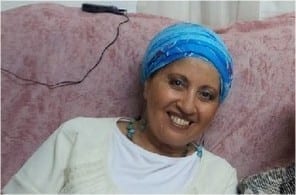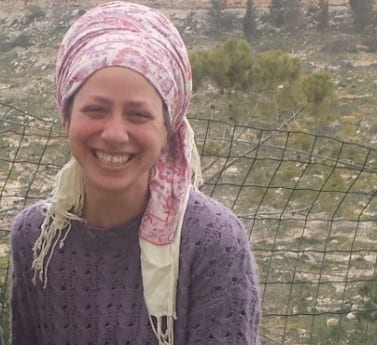When I first met Robin Meyerson, a literary quote popped into my head: “Though she be but little, she is fierce!” With the voice of a sweet school teacher, Robin described her journey from international traveler to global marketing whiz to baalas teshuvah and PR rep for the Jewish people. When she was a year old, Robin’s family left her birthplace of California, and she embarked on an international childhood; she lived in Australia until age five, in Malaysia until age ten, and in Europe until she left for college at 16. “My father is English and my mother likes to travel,” Robin explains. “It was a great opportunity to learn about world cultures.”
That taste for travel and culture compelled Robin to pursue a degree in international business at a college in Arizona. She had no plans to stay there, but at 19 she met her husband, a born-and-bred Arizonan, and decided to stick around. She’s been there ever since, though the family still travels every year. “My husband gave me roots,” says Robin, “and I gave him his first passport!” After receiving her degree, Robin worked in marketing and sales for nearly 20 years, including a position as the global marketing director for a Fortune 200 company and an adjunct business professor at a community college. While she loved her work, the long hours kept her away from her growing family. She was not yet religious, so Shabbos didn’t exist for her. It was her mother-in-law’s death that compelled her to reevaluate. “As I was going through her things, I asked myself, ‘What are my kids going to know about me?
They’re going to know about my awards and my résumé, but they’re never going to see me,’” Robin remembers. She decided to leave her jobs and learn about her heritage, devote her attention to her family, and use her marketing and writing talents for Jewish causes. Her family, of course, was thrilled with the news, although it did take some adjustments on everyone’s part. “I had a big income and I went to zero income,” says Robin. “It was a real leap of faith.” She began studying at the Phoenix Community Kollel, organized classes in her home, and read every book about Judaism she could find. “My husband likes to buy books and I like to read them,” she says. “We had this giant empty book case and we filled it to capacity.
I read every single one of those books.” As she continued on her journey to observance, she learned alongside her children, who would come home from day school with new traditions they’d been taught. “They’d bring things home to me, and I took them on,” says Robin. In the meantime, she began marketing for the Phoenix Community Kollel, whose inspiring Jewish programming needed a wider reach. Her first event drew 700 attendees from both the observant and secular Jewish communities. Following that success, Robin launched Jewish Spirit Magazine, a national quarterly publication that featured “soft-sell” content (“Look Who’s Going Kosher!”) to inspire newly observant Jews and put the kollel on the map. Robin ran the magazine for seven years, inspiring tens of thousands of readers—including herself. “I learned about Judaism from what I was putting in the magazine,” she says.
While editing Jewish Spirit, Robin also published her first book, A Son Returns, a compilation of miracle stories that occurred during her process of becoming observant. Its sequel, A Son Returns 2, was published a few years later. Her goal in writing the books was to explain the meaning of hashgachah pratis and encourage people to pay attention to the messages Hashem is sending them. Today Robin speaks on college campuses and at Jewish organizations, sharing her own stories and listening to others’. Eight years ago, Robin read an article in the local Jewish news about the Jewish Tuition Organization Board, which collects money for scholarships through redirected state tax credits. She was amazed to see that they had raised only $400,000. She picked up the phone and called them. “I said, ‘What are you doing to market this?’ The next thing I knew, I was put on the board and put to work.” Robin spent eight years spreading word about the organization, which helped expand its funding from $400,000 to $2 million.
But Robin’s most recent project is her real passion—raising awareness about Jewish burial. A miracle in her own life propelled her in this unexpected direction. Three years ago, her Uncle Arnold passed away. An unobservant Jew, Arnold’s children planned on cremating him. Robin had been volunteering with the chevrah kaddisha for a few years and was devastated to learn that her uncle might not have a halachic burial. After pleading with her cousins, she called Chevra Lomdei Mishna to have them learn mishnayos for her uncle.
That same day, Robin’s cousins called to tell her that they’d changed their plans; Uncle Arnold had appeared to one of them in a dream and said, “Don’t cremate me.” He would be buried according to halachah. “I still shudder when I think about it,” Robin recalls. At the cemetery, Robin’s aunt told her, “G-d is going to repay you for this.” And He did; a few months later, Robin, then 43, learned that she was expecting. Her son was born on Shushan Purim, Uncle Arnold’s yahrtzeit. Inspired by her own experience, Robin works tirelessly to fight the Jewish burial crisis. And it is a crisis; in the United States alone, 50 Jews are cremated daily.
Robin published and wrote the foreword for the book Cremation or Burial: A Jewish View, and alongside the National Association of Chevra Kadisha, she created the website www.peacefulreturn.org, which educates visitors about the guidelines and benefits of halachic burial. She speaks publicly on the topic and has written teaching materials and produced PowerPoint presentations and videos for rabbis to use to educate their communities. “We urge rabbis across the country to speak about burial during their sermons on Parshas Vayechi,” says Robin. She’s seen some successes, including a 100-year-old man who changed his will to declare that he wanted to be buried instead of cremated.
Robin has sometimes been called to counsel family members in the heat of debate. “I get crisis calls from family members who are baalei teshuvah and have a nonreligious relative who is due to be cremated. Sometimes we can work it out; other times it’s sadly too late.” Robin has also created a curriculum for students from kindergarten through high school about the value of Torah study, tzedakah and chesed as merits for the neshamos of deceased loved ones. She hopes that by teaching about the topic in a sensitive way, “it will provide comfort before there’s a crisis and teach kids about their ability to maintain the relationship with that person [who is no longer alive].”
Her goal is to see her curriculum implemented in every day school across the country. She may have quit her round-the-clock job, but Robin still works full-time on behalf of the Jewish community. The difference is that now it’s a family affair. “I want to pursue my mission with my children,” she says. “I involve them in everything.” Like any working mom, Robin makes sure to balance outside demands with her family’s needs, taking her children on one-on-one outings and trips. “I need to put my kids first,” she says, “because I’m the only mom they have.” Still, her larger mission is clear: “Ultimately, I want to help restore the Jewish people to the glory we had.” With a woman like Robin Meyerson, we’re well on our way.





